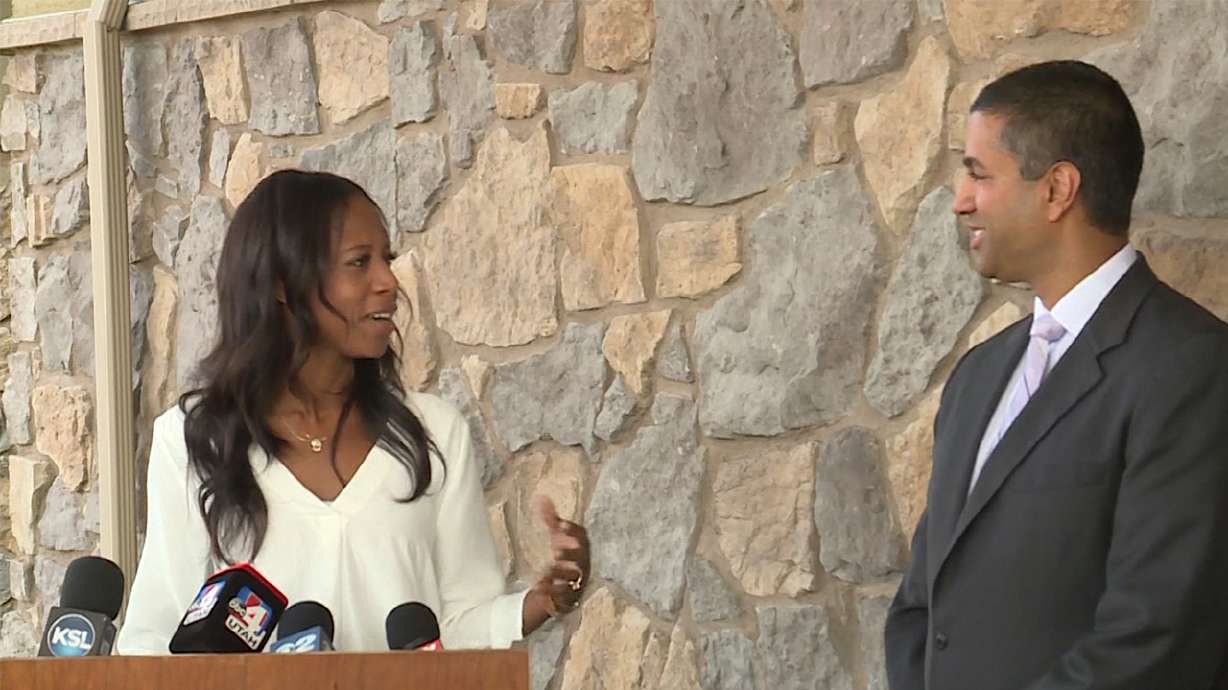Estimated read time: 4-5 minutes
This archived news story is available only for your personal, non-commercial use. Information in the story may be outdated or superseded by additional information. Reading or replaying the story in its archived form does not constitute a republication of the story.
EAGLE MOUNTAIN — As net neutrality became an increasingly hot-button issue in 2017, Federal Communications Commission Chairman Ajit Pai became the poster child of its controversy.
Internet activists, who decried the chairman’s efforts to end Obama-era regulations that prohibited internet providers from discriminating against content, plastered Pai’s face on memes and protest posters, some even dubbing him the “nemesis of net neutrality.”
Despite public backlash, however, the FCC voted to end regulations in June. Politicians across the country have since worked to bring net neutrality back, either on a state or federal level.
On Thursday, Pai joined Rep. Mia Love, R-Utah, in Eagle Mountain for a meeting to discuss ways to bridge the digital divide with rural broadband. The meeting was closed to the press, but Pai and Love stopped for a brief question-and-answer afterward — which quickly turned into a discussion about net neutrality.
Love began by emphasizing that the Thursday meeting was just a step on the way to finding permanent solutions on how the internet should be regulated. Both Pai and Love agreed that the best way to move forward with net neutrality was to put the ball in Congress’ court.
“That’s one of the reasons we brought the chairman out here, because it’s important we push the urgency of getting something done legislatively,” Love said. “I really don’t care about what (the FCC) is doing. I care about what the legislation would look like. We should be driving what the FCC is doing.”
When asked what she would like to see in a bill on net neutrality, Love gave a fairly broad answer, adding that she’d like to ensure internet access everywhere and prevent internet providers from throttling speeds.
Pai agreed that it would be beneficial for Congress to legislate components of net neutrality that “everyone agrees with,” and stressed the importance of cultivating competition between internet service providers.
Most people in the U.S. only have one or two internet service providers to choose from, so if one of those providers is throttling the internet or not abiding by net neutrality principles, the consumer doesn’t have much of a choice but to stick with them.
Ajit Pai, director of the FCC and poster child of the net neutrality controversy, is in Utah to talk about the digital divide with Rep. Love. The meeting was closed to media. Q&A to follow pic.twitter.com/TCtaRggRRT
— Liesl Nielsen (@liesl_nielsen) August 23, 2018
If there’s competition and an internet provider throttles the internet, customers can simply change providers. Yet the ISP industry has become increasingly monopolistic, and it can be difficult for smaller ISPs to get off the ground.
Pai said there are a few ways the FCC is trying to promote competition, including modernizing regulations by adopting approvals for satellite companies to send thousands of satellites into lower orbit so they can beam internet to more rural areas. The organization has also worked to make it easier for smaller providers to gain access to utility poles, he said.
Pai also credited his leadership for the change in the way the FCC subsidizes, including giving money to wireless competitors in more rural areas rather than areas that already have five or six ISP options.
In an ironic twist, I did not have sufficient internet connection to continue tweeting the Q&A. The main idea: @RepMiaLove, like Rep. John Curtis, believes it's Congress' job to rewrite the telecommunication laws for 2018 and she doesn't really care what the FCC is doing
— Liesl Nielsen (@liesl_nielsen) August 23, 2018
Some local industry leaders, however, are skeptical about Pai’s approach.
“Satellite internet access is terrible and is plagued by inherent latency by the physics of the speed of communication. If the FCC was serious about robust competition, they would finance open municipal fiber networks,” Pete Ashdown, CEO of local internet provider XMission, told KSL.com.
Open municipal fiber networks are essentially fiber networks constructed by a city or state on which any ISP can provide service. The state or city can construct the fiber networks in whichever way they want to execute it, Ashdown said, then maintain it using money that ISPs pay to use the networks.
Ashdown said he believes Pai has a record of favoring industry infrastructure over municipal networks, and therefore doesn’t understand that those networks can offer ISPs a level playing field on which to compete.
“Robust competition on a level playing field would negate the net neutrality argument for the consumer,” he said.












